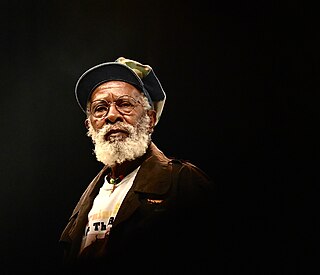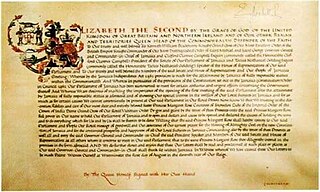Related Research Articles

Rastafari, sometimes called Rastafarianism, is an Abrahamic religion that developed in Jamaica during the 1930s. It is classified as both a new religious movement and a social movement by scholars of religion. There is no central authority in control of the movement and much diversity exists among practitioners, who are known as Rastafari, Rastafarians, or Rastas.
Black supremacy or black supremacism is a racial supremacist belief which maintains that black people are inherently superior to people of other races.

Winston Rodney OD, better known by the stage name Burning Spear, is a Jamaican roots reggae singer-songwriter, vocalist, and musician. Burning Spear is a Rastafarian and one of the most influential and long-standing roots artists to emerge from the 1970s.

Marcus Mosiah Garvey Jr. was a Jamaican political activist. He was the founder and first President-General of the Universal Negro Improvement Association and African Communities League, through which he declared himself Provisional President of Africa. Garvey was ideologically a black nationalist and Pan-Africanist. His ideas came to be known as Garveyism.
The Holy Piby, also known as the Black Man's Bible, is a text written by an Anguillan, Robert Athlyi Rogers, for the use of an Afrocentric religion in the West Indies founded by Rogers in the 1920s, known as the Afro-Athlican Constructive Gaathly. The theology outlined in this work saw Ethiopians as the chosen people of God. The church preached self-reliance and self-determination for Africans, using the Piby as its guiding document.
Leonard Percival Howell, also known as The Gong or G. G. Maragh, was a Jamaican religious figure. According to his biographer Hélène Lee, Howell was born into an Anglican family. He was one of the first preachers of the Rastafari movement, and is known by many as The First Rasta.
The People's Political Party (PPP) was Jamaica's first modern political party. It was formed in 1929 by Marcus Garvey.
The Ethiopian Zion Coptic Church is a religious movement that originated in Jamaica during the 1940s and later spread to the United States, being incorporated in Florida in 1975. Its beliefs are based on both the Old and New testaments of the bible, as well as the teachings of Marcus Garvey, self-reliance, Afrocentricity and Ethiopianism. Their ceremonies include bible reading, chanting, and music incorporating elements from Nyahbinghi, Burru, Kumina and other indigenous traditions. The group holds many beliefs in common with the Rastafari, including the use of marijuana as a sacrament, but differ on many points, most significantly the matter of Haile Selassie's divinity.
The Rastafari movement in the United States echoes the Rastafari religious movement, which began in Jamaica and Ethiopia during the 1930s. Marcus Garvey, born in Jamaica, was influenced by the Ethiopian king Haile Selassie. Jamaican Rastafaris began emigrating to the United States in the 1960s and 1970s, and established communities throughout the country.

Alexander Bedward was the founder of Bedwardism. He was one of the most successful preachers of Jamaican Revivalism. Along with Joseph Robert Love, Bedward was one of the forerunners of Marcus Garvey and his brand of pan-Africanism.
Amy Ashwood Garvey was a Jamaican Pan-Africanist activist. She was a director of the Black Star Line Steamship Corporation, and along with her former husband Marcus Garvey she founded the Negro World newspaper.
Black nationalism is a nationalist movement which seeks representation for black people as a distinct national identity, especially in racialized, colonial and postcolonial societies. Its earliest proponents saw it as a way to advocate for democratic representation in culturally plural societies or to establish self-governing independent nation-states for black people. Modern black nationalism often aims for the social, political, and economic empowerment of black communities within white majority societies, either as an alternative to assimilation or as a way to ensure greater representation and equality within predominantly Eurocentric or white cultures.
For a history of Afro-Caribbean people in the UK, see British African Caribbean community.
The following is a timeline of the history of the city of Kingston, Jamaica.

The Colony of Jamaica gained independence from the United Kingdom on 6 August 1962. In Jamaica, this date is celebrated as Independence Day, a national holiday.

Black Cross Nurses is an international organization of nurses which was founded in 1920, based upon the model of the Red Cross. The organization was the women's auxiliary of the Universal Negro Improvement Association and African Communities League and was established to provide health services and education to people of African descent.
Wilfred Adolphus Domingo was a Jamaican activist and journalist who became the youngest editor of Marcus Garvey's newspaper, the Negro World. As an activist and writer, Domingo travelled to the United States advocating for Jamaican sovereignty as a leader of the African Blood Brotherhood and the Harlem branch of the Socialist Party.
Robert A. Hill is a Jamaican historian and academic who moved to the United States in the 1970s. He is Professor Emeritus of History and Research Professor at the University of California, Los Angeles (UCLA), and Visiting Fellow at The Sir Arthur Lewis Institute of Social and Economic Studies (SALISES), University of the West Indies at Mona, Jamaica.

Maymie de Mena was an American-born activist who became one of the highest-ranking officers in the Universal Negro Improvement Association (UNIA). She has been credited with keeping the organization alive after Marcus Garvey's conviction for mail fraud and deportation from the United States.
The Rastafari movement developed out of the legacy of the Atlantic slave trade, in which over ten million Africans were enslaved and transported to the Americas between the 16th and 19th centuries. Once there, they were sold to European planters and forced to work on the plantations. Around a third of these transported Africans were relocated in the Caribbean, with under 700,000 being settled in Jamaica. In 1834, slavery in Jamaica was abolished after the British government passed the Slavery Abolition Act 1833. Racial prejudice nevertheless remained prevalent across Jamaican society. The overwhelming majority of Jamaica's legislative council was white throughout the 19th century, and those of African descent were treated as second-class citizens.
References
- 1 2 3 Barnett, Michael, "Rastafari in the New Millennium: A Rastafari Reader." Syracuse University Press (2014), p. 296, ISBN 9780815633600 (retrieved 23 April 2024)
- ↑ Tafari-Ama, Imani M., "Blood, Bullets And Bodies: Sexual Politics Below Jamaica's Poverty Line." Beaten Track Publishing (2017), p. 288, ISBN 9781786451378 (retrieved 23 April 2024)
- ↑ Price, Charles, "Rastafari: The Evolution of a People and Their Identity." NYU Press (2022), p. 29, ISBN 9781479807154 (retrieved 23 April 2024)
- ↑ Barnett, Michael, "Rastafari in the New Millennium: A Rastafari Reader." Syracuse University Press (2014), p. 311, ISBN 9780815633600 (retrieved 23 April 2024)
- 1 2 3 4 Price, Charles, "Rastafari: The Evolution of a People and Their Identity." NYU Press (2022), pp. 29-30, ISBN 9781479807154 (retrieved 23 April 2024)
- ↑ Lansford, Tom, "Political Handbook of the World 2015." CQ Press (2015), p. 3101, ISBN 9781483371559 (retrieved 23 April 2024)
- ↑ The Gleaner, "Idle lands to willing hands ... Marcus Garvey party wants property distribution" (18 September 2015) (retrieved 23 April 2024)
- ↑ "Independents Unite To Unseat PNP, JLP". Jamaica Gleaner. 16 February 2016. Retrieved 19 February 2016.
- ↑ "Nomination day highlights". Jamaica Observer . 11 February 2016. Retrieved 19 February 2016.